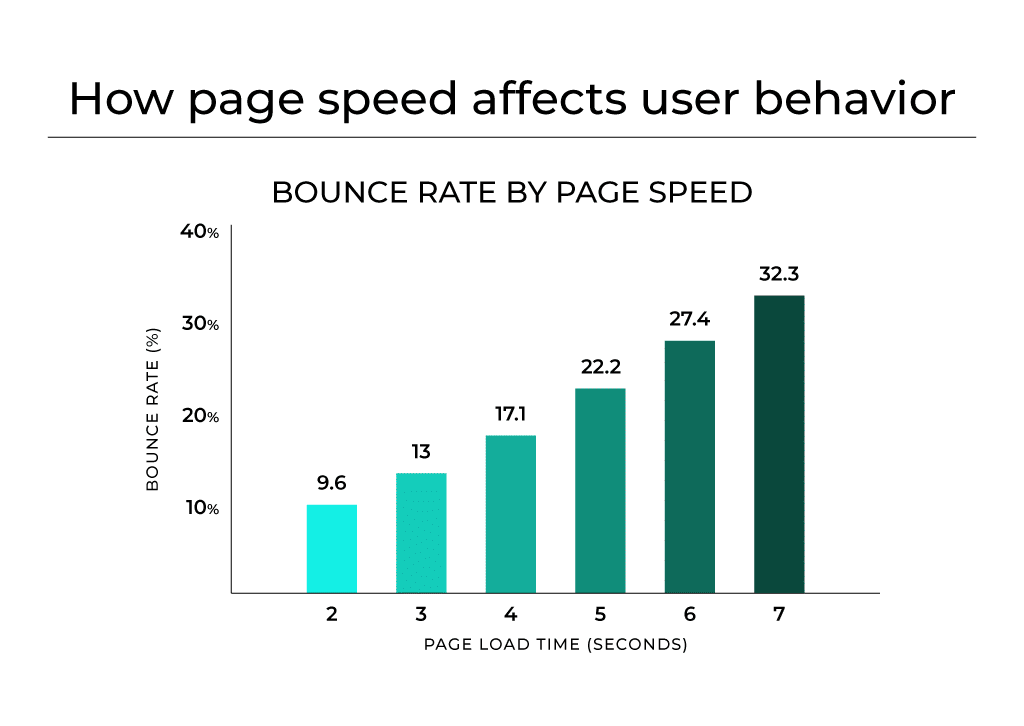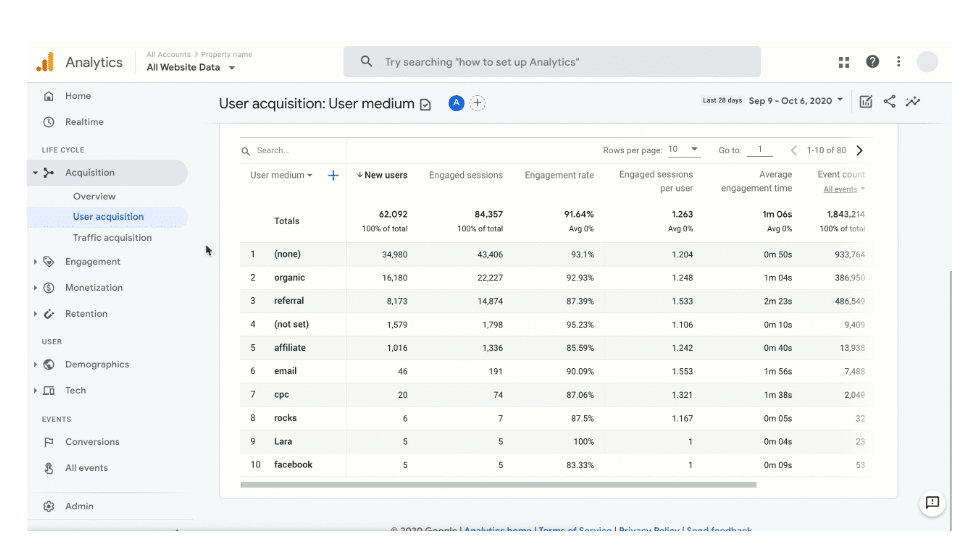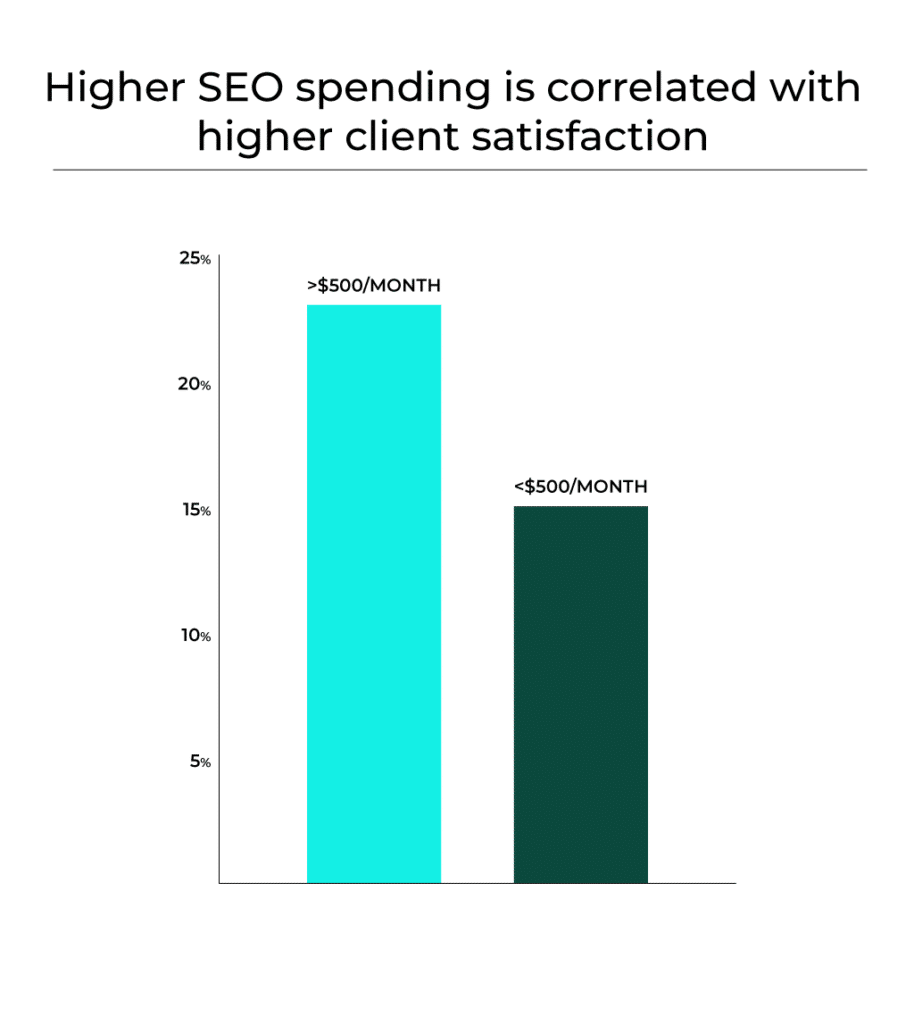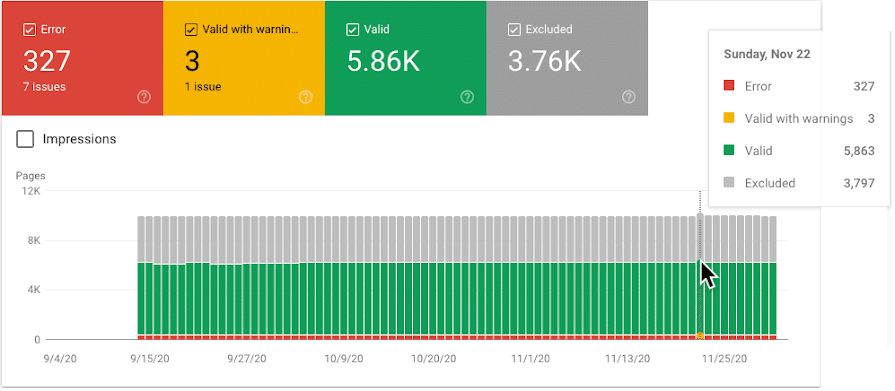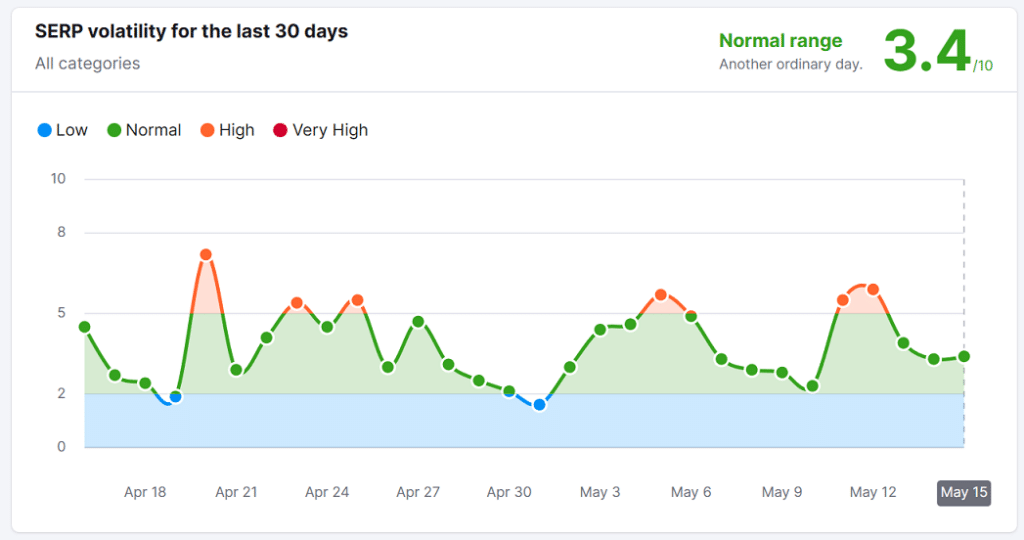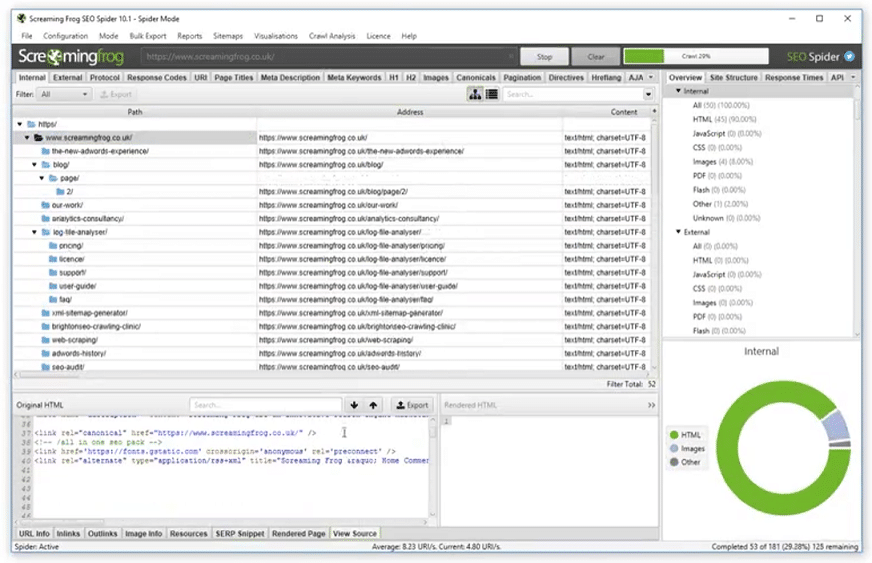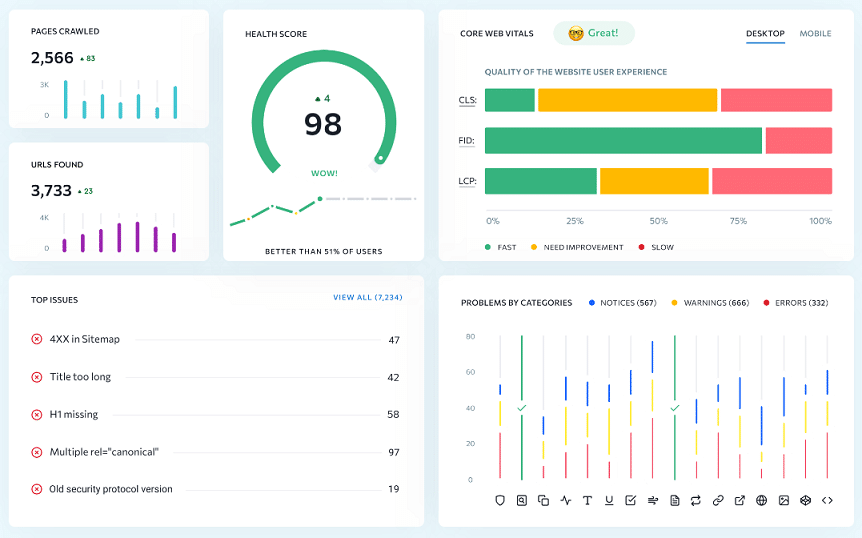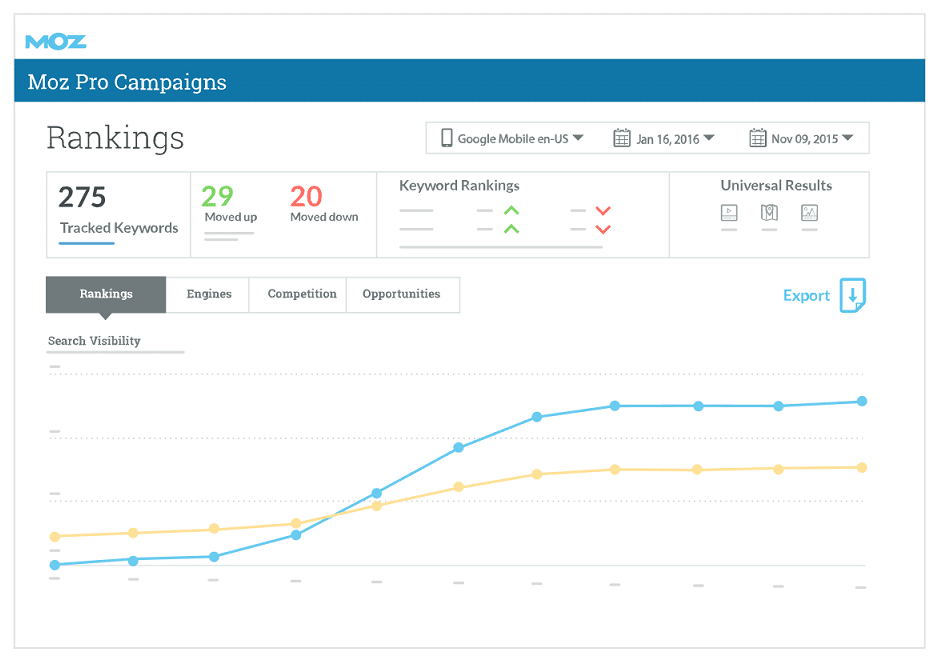SaaS SEO Guide
SaaS SEO audit: Develop and improve your foundations
Book a FREE SEO Strategy Consultation >
Further Reading:
You might have spent a ton of effort making your website look good, but it’s no use if people can’t find it. For SaaS companies who rely on organic traffic, it’s vital to achieve a high ranking in the search engine results pages.
If your position isn’t as high as you’d like, you need to check that your website is fully optimized for performance and content, which is where a SaaS SEO audit comes in.
We’re going to explore exactly what a SaaS SEO audit is, take you through the steps involved, and suggest the best tools to use.
What is a SaaS SEO audit?
Search engine optimization means improving various elements of your website so that it ranks highly with search engines like Google. When your site is favored by search engine algorithms, it’ll appear near the top of relevant results pages (SERPs)—increasing your organic traffic and brand awareness.
Google has more than 200 ranking factors and tweaks its algorithms regularly (3,000 changes per year at the last count). That means SEO isn’t a one-and-done thing. You need to review your website continuously to ensure it meets the latest criteria.
An SEO audit is a comprehensive evaluation of your website, which reveals any issues that may be hindering your ranking positions. It helps you look at your site in the way that a search engine bot or crawler would, and identifies ways you can improve your performance.
So now we know the SEO audit definition, but how does it work for SaaS businesses?
For companies selling software as a service, it’s vital that your website ranks highly in the SERPs so that people can find it easily—even when they’re not specifically searching for your brand.
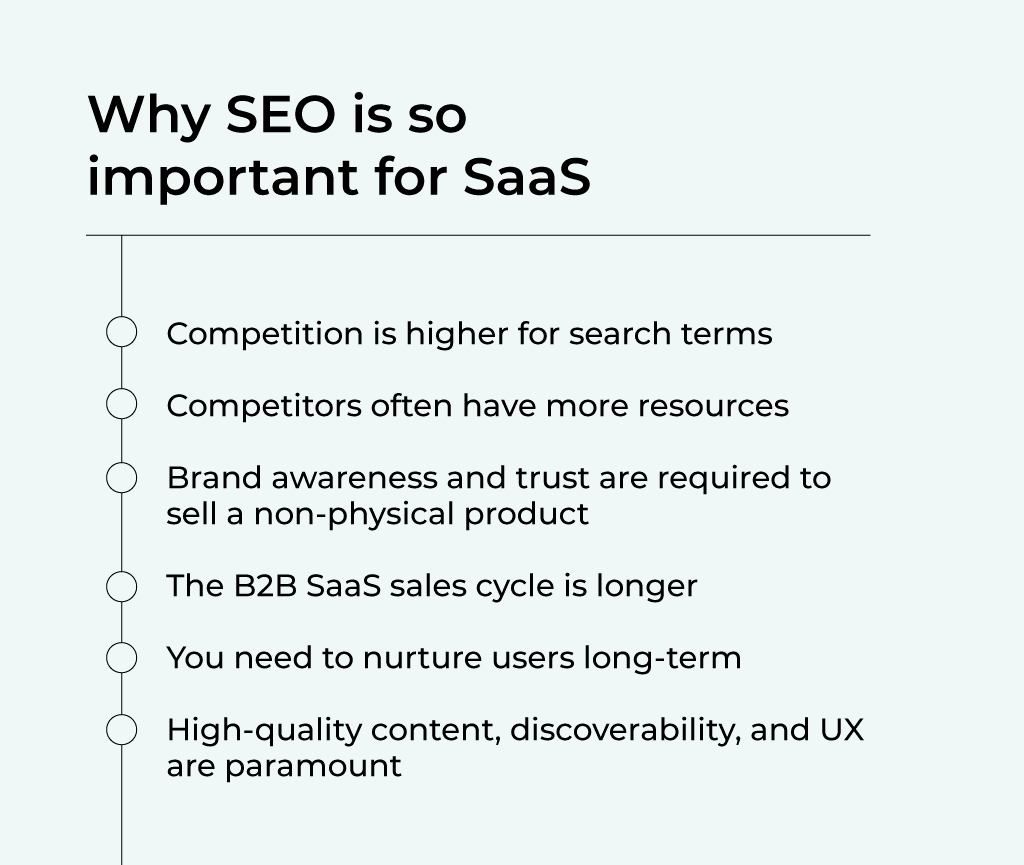
SaaS has a lengthy sales funnel, as the products are intangible and you’re largely selling B2B. So, apart from attracting relevant visitors, SaaS SEO is all about keeping them engaged.
As well as technical optimization for the best user experience, a SaaS SEO audit focuses on content for every stage of the customer journey.
Sounds daunting? Well, in addition to the free and paid-for SEO tools on the market, there are many consultants and agencies offering a SEO audit service, which could help you take some of the weight off.
How to do a SaaS SEO audit
There are three options for carrying out a SaaS SEO audit. If your website is small and simple—as some SaaS sites are—you may be able to handle the SEO audit process in-house. If not, you could bring in experts to work alongside your team. Or you could outsource the entire task to an agency.
For now, we’ll show you how to perform the audit using widely-available SEO tools. These are typically referred to as SEO crawlers, which go through your site just like a search engine bot would. (Later in the post, we’ll discuss the tools in more detail).
Technical SEO audit
This is where you check for errors on your web pages and generate a list of all the technical fixes required.
Here are some of the main things to look out for:
- Navigation: Visitors must be able to find their way around your site, so check for broken links (404 errors) and redirect issues. Screaming Frog detects temporary and permanent redirects. Make sure your pages are linked to an XML site map, and include a HTML sitemap in the footer.
- Page load speed: If your pages are slow to load, visitors won’t hang around for long. Check elements like image compression, unused code, and server response time.
- Mobile accessibility: It’s important that your site is properly optimized for mobile devices, and you can check this with Google’s Mobile-Friendly Testing tool.
- Indexed pages: You need to ensure Google is indexing only one version of each page, and that it’s the correct one. Google Search Console tells you how many pages your site has indexed in Google, and displays a list of pages that haven’t been indexed.
- Code: If your code is badly written, it’s harder for search engines to crawl and understand. Pages should be W3C-validated (the industry standard for clean source code), and at least 25% of the source code should be text and not HTML.
- Engagement metrics: You can also look at bounce rate, average time spent on site, and return rate as part of SaaS technical SEO. Google Analytics has this information.
Onsite or on-page SEO audit
Once the technical issues are noted, now you have to make sure your website has a good internal linking structure and quality content that engages your visitors.
Check the following:
- URL and metadata: Look at your title tags and meta descriptions—are they short, relevant, and unique? Crawler tools will also tell you if your URLs are SEO-friendly.
- Links: Proper internal linking helps search engines move quickly through your important site content. Your tool should flag up orphan pages, which don’t have any internal links pointing to them.
- Page structure: It should be easy for a search engine to read your pages and determine the content’s authority and relevance. Look for issues with formatting and headings.
- Images: Look out for slow-loading or pixelated images, and missing alt text (or alt text that’s just a generic file name).
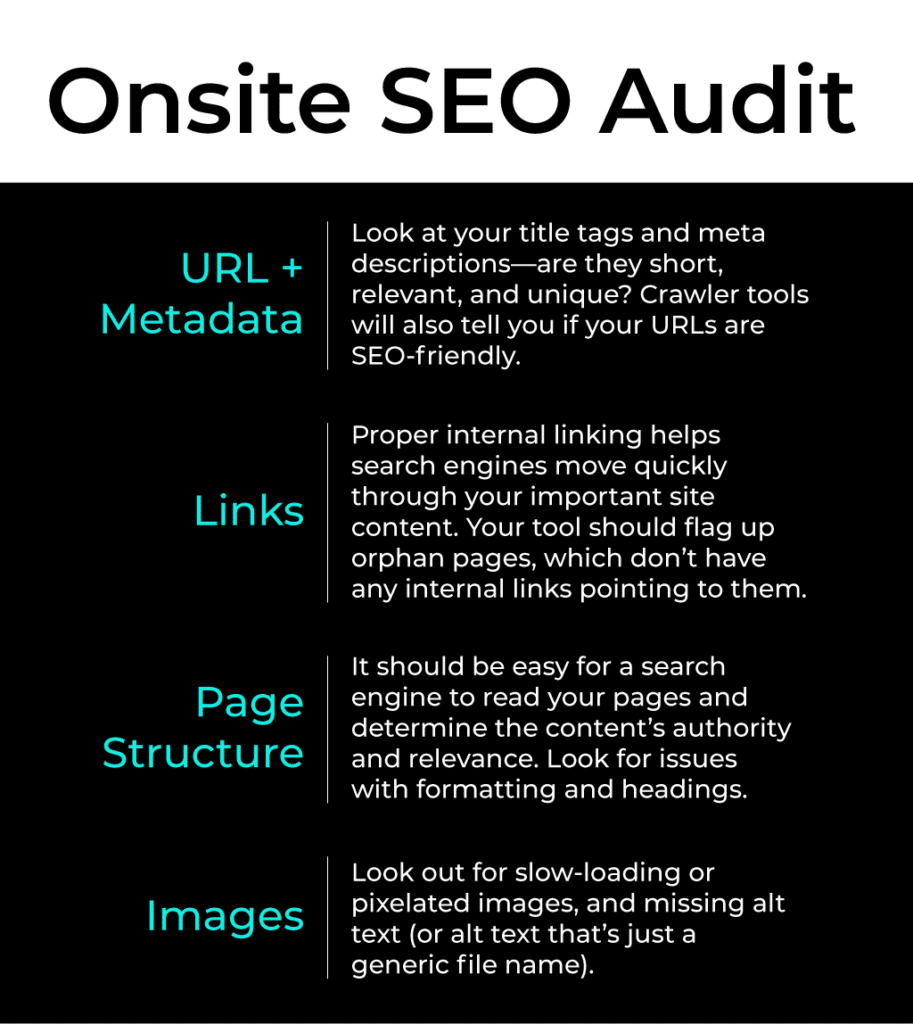
As part of the onsite audit, you need to carry out an SEO keyword audit and a specific content audit for SaaS.
You want to ensure high quality content that satisfies search intent at different stages of the customer journey. There are tools that will check for optimum length, duplicate content, and plagiarism, as well as correct spelling and grammar.
Have your tool crawl the site for keyword placement and density, which will reveal any keyword stuffing and keyword cannibalization (all or many of your webpages targeting the same keyword). You can also perform a keyword gap analysis to see where you might improve in comparison with competitors.
Off page SEO audit
You also need to pay attention to your off-page SEO. We’re talking about backlinks to your site from external websites and making sure those links enhance rather than hinder your performance.
As well as broken links, you need to consider:
- Referring domains: How many sites are linking to you? If there are only a few, you need to focus on your link-building strategy.
- Domain authority: It’s important that your backlinks come from reputable sites, as this is a key factor in determining search engine rankings. Ahrefs will scan your links and generate a Domain Authority value. You can then disavow any low-value or spammy links.
- Competitor analysis: Identify your high-ranking competitors’ backlinks. You can then reach out to the domains linking to them and suggest a partnership. You can do the same if you spot broken links on a rival website.
Analytics audit
It’s wise to make sure that the web analytics you’re using are capturing the right data from the right places.
A Google Analytics audit helps you analyze the quality of your web data. For instance, if you already placed a GA tracking code on your webpages, you need to know that it’s collecting data from all of them properly. Check that your Google Ads account is linked to your GA account.
Final steps
Your SaaS SEO audit will reveal all kinds of areas for improvement. After you’ve identified the issues and worked on fixing them, you need to track your progress.
Have your rankings improved? Are you seeing a boost in organic search traffic and user engagement?
Remember when we said that SEO wasn’t a one-and-done thing? You need to run regular audits on your website to ensure that you don’t let errors creep in or fall foul of algorithm updates.
How long does an SEO audit take for SaaS businesses?
Just as no two SaaS businesses are identical, no two audits are exactly the same. The time frame depends on various factors, including the size and complexity of your website, and the shape it’s in currently. It also depends if you carry out the audit yourself or bring in expert help.
Many SaaS companies have small websites with relatively simple architecture and fewer page templates in the CMS, which in theory means there should be fewer technical SEO issues. It’ll take less time for a crawler tool to search the site and there won’t be so many results to analyze.
However, audits are still time-consuming, especially when you have all your other daily business tasks to complete. If you’re only looking at specific elements, you might do this in a matter of hours. But a full-scale audit can take anything from a couple of days to a couple of weeks, or more.
Don’t forget, the process doesn’t end with the audit itself—you have to analyze the results and spend time fixing the problems they reveal. You must also continue to check your site on a regular basis. It’s best to make yourself a SaaS SEO checklist and use it each time you run an audit.
How much does an SEO audit cost for SaaS companies?
Again, the cost of a SEO audit varies widely. It’s also dependent on the scope of the audit—are we talking about the cost of carrying it out or the overall cost involved in optimizing your site based on your findings?
Several of the SEO tools on the market are free or at least have free versions. But you’ll have to factor in the time and effort taken by your in-house team. Of course, until the audit is carried out, you won’t know how much there is to fix.
If you decide to hire a consultant or agency, they’ll provide an estimate based on the scope and required resources. It’s possible to pay someone to carry out an audit and give you the results, but you might also want the experts to help you optimize your site.
For a SaaS company, it’s vital that the audit includes a comprehensive content review. For example, accelerate agency offers two types of SEO site audit service. They’ll either work as an extension of your marketing team and provide recommendations, or produce SEO content on your behalf.
The good news is that SEO is proven to generate extra traffic and leads, so you should see a strong ROI. Organic traffic from SEO is “free” (compared to PPC and other marketing efforts), and the right SaaS SEO strategy brings sustainable growth.
Best SaaS SEO audit tools
We already mentioned a few of these tools in the article; now let’s see exactly what they all do:
Google SEO tools
Google provides an array of free SEO tools, so we’ve picked the most useful ones for a SaaS site audit.
Let’s start with Google Search Console (GSC), which is actually a suite of smaller SEO tools for checking indexability, user experience, keyword visibility, and technical issues.
Here are some of the key elements:
- GSC Insights (showing how your content performs in searches)
- Core Web Vitals Report
- Mobile Usability Report
- Index Coverage Report
- Sitemaps Report
- Links Report (Google also has a Disavow tool in case you find spammy links.)
Technical issues are also flagged by Google PageSpeed Insights, which summarizes and scores page performance. If you use Chrome as your browser, you can incorporate Chrome DevTools to assess website speed, accessibility, and security issues.
Meanwhile, Google Analytics is great for measuring user engagement. It tracks and reports site traffic from different sources and shows visitor behavior—such as how many pages they view and how much time they spend on each.
Price: All of the above tools are free.
Semrush
Semrush is an all-in-one platform incorporating more than 50 tools, from keyword research and competitor intelligence to content optimization and rank tracking. You can run an in-depth site audit based on 130 different checks for technical and on-page SEO problems.
These include Core Web Vitals, internal linking, meta tags, page loading speeds, JavaScript and CSS, and HTTPS security protocols. As well as pointing out the main issues impacting performance, Semrush provides detailed explanations, which is handy for newbies.
It also generates thematic and custom reports for specific aspects of technical SEO, such as crawlability, site performance, and international SEO. There are Keyword Gap and Backlink Gap tools, with the ability to view the exact terms that your competitors rank for.
Other tools include the Log File Analyzer, which shows you how a Google crawler interacts with your website, and the Semrush Sensor, which tracks and monitors Google SERP volatility to identify any indications of Google algorithm updates. You can add the SEOquake browser extension to quickly analyze any webpage.
Price: There is a free version but it’s limited. You can submit a maximum of 10 Analytics reports requests per day, create and manage only one Project, and track 10 keywords. The lowest-priced subscription starts at $119.95/month. There’s also a free 7-day trial.
Ahrefs
With Ahrefs, you can either use their selection of free SEO tools or subscribe to the core all-in-one package (comprising Site Audit, Site Explorer, Keyword Explorer, Rank Tracker, and Content Explorer).
The free stuff includes a broken link checker, website authority checker, and various keyword tools—and you can also run a free site audit with Webmaster Tools.
The audit scans your site—including the desktop and mobile versions—for more than 140 technical and on-page SEO issues, and gives you advice on fixing them. These include problems with HTML tags, social tags, content quality, localization, links, broken images, and low word count articles.
The tool groups the issues by type and generates shareable reports with charts, as well as an overall score of SEO health. It also browses your website’s backlink data, shows you which keywords bring the most traffic, and compares your site against competitors in the SERPs.
In the paid plans, you can schedule automatic daily, weekly, and monthly site crawls, and receive automated email alerts about your website’s SEO health, new and lost backlinks, and keyword rankings. You also get an SEO dashboard for tracking performance and progress.
Price: Free Webmaster tools give you 5,000 crawl credits per project, per month (although broken URLs, redirects or any non-HTML resources aren’t counted). Paid plans start at $99/month, with additional users and data charged on a pay-as-you-go basis.
Screaming Frog SEO Spider
Screaming Frog SEO Spider is a downloadable tool that quickly audits websites of any size, shows you the results in real time, and delivers SEO recommendations. It’s focused on technical SEO rather than any other areas, and will diagnose all the most common issues.
SEO Spider will identify broken links and redirect chains, as well as server errors and URLs blocked by robots.txt, meta robots, and X-Robots-Tag directives. It will find issues with metadata and page titles, reveal duplicate content, and perform word counts.
The tool also generates accurate XML sitemaps that get your pages indexed faster, and creates visualizations of your site architecture to help you evaluate internal linking and URL structure. You can export key onsite SEO elements to a spreadsheet and use it as a base for SEO recommendations.
There’s a free version that allows you to crawl up to 500 URLs on unlimited websites. If you want to access advanced features like scheduling and configuration, you can upgrade to the paid plan which integrates with Google Analytics, Google Search Console, and PageSpeed Insights.
Price: Free limited version; paid plan offers unlimited URL crawling plus scheduled crawls and integrations for $259/user/year. There are discounts on bulk purchases of five or more licenses at a time.
SE Ranking
SE Ranking is another all-in-one platform with more than 30 SEO tools, including a website audit, keyword research, and competitor research tool. It will crawl your website (including test domains and subdomains) using 130 parameters and show you how to fix a range of technical issues.
The tool checks your site’s Core Web Vitals to assess overall website health, and detects user experience issues such as slow-loading pages. It’ll identify pages with missing or duplicate meta tags, check your index status, and monitor backlinks and domain trust.
The solution also helps you to fix issues like missing alt text and errors in JavaScript files, and lets you generate a XML sitemap. SE Ranking provides detailed reports with actionable insights, and you can view problems by category on a central dashboard.
Apart from the paid plans, there are free tools for checking word count, website speed, and redirects. You can generate a robots.txt file to help your site get indexed, and check if any URL is blocked. These tools provide data on traffic and keywords for any subdomain.
Price: The free tools are limited, but paid plans start at $39.20 per month (for a single user, with the website audit covering up to 40,000 pages). There’s a 14-day free trial.
Moz SEO Tools
Moz offers a range of free SEO tools, including a keyword explorer, competitive research tool, link explorer, and free domain analysis of any site. You can find keyword gaps and content opportunities, check keyword difficulty, and analyze anchor text. The tools will give your backlinks a spam score, and find and fix broken links.
One of the free tools, MozBar, is a Chrome extension that helps you gather link metrics for domains and pages (including page authority, domain authority, and backlink numbers) as you search. You can compare link metrics across pages, and expose page elements, general attributes, and markup.
The Mozcast feature tracks “weather” patterns and trends in the Google algorithm, with hot and stormy weather denoting significant changes. You can see results for the previous day, plus a 90-day history. The tool also reports on Google SERP features such as HTTP results, knowledge graphs, and related questions.
For more advanced tools and in-depth analysis, you can pay for the all-in-one Moz Pro. This lets you create custom reports, perform a full content audit, and receive alerts about problems. The tool quickly crawls large sites and tracks new and recurring issues over time. It provides interactive charts showing you the total number of issues and results by category.
Price: Moz Pro starts at $79/month for a single user, crawling up to 400,000 pages per month. There’s a free 30-day trial.
Alternative choice:
If you want to carry out a SaaS SEO audit yourself, you’ll find a suitable tool on the list above. But like we said earlier, you might prefer to have the experts do it on your behalf.
For example, accelerate agency specializes in SEO for SaaS companies, providing comprehensive audits for technical, onsite, and offsite SEO, plus content. You’ll get detailed monthly reports that track growth and point out opportunities—such as competitor intelligence reports, keyword gap analysis, and AI content analysis.
The agency excels at link-building and content outreach, thanks to relationships with high-authority domains. The 50+ strong team of creators and editors will create content for you, or work alongside your own marketing team.
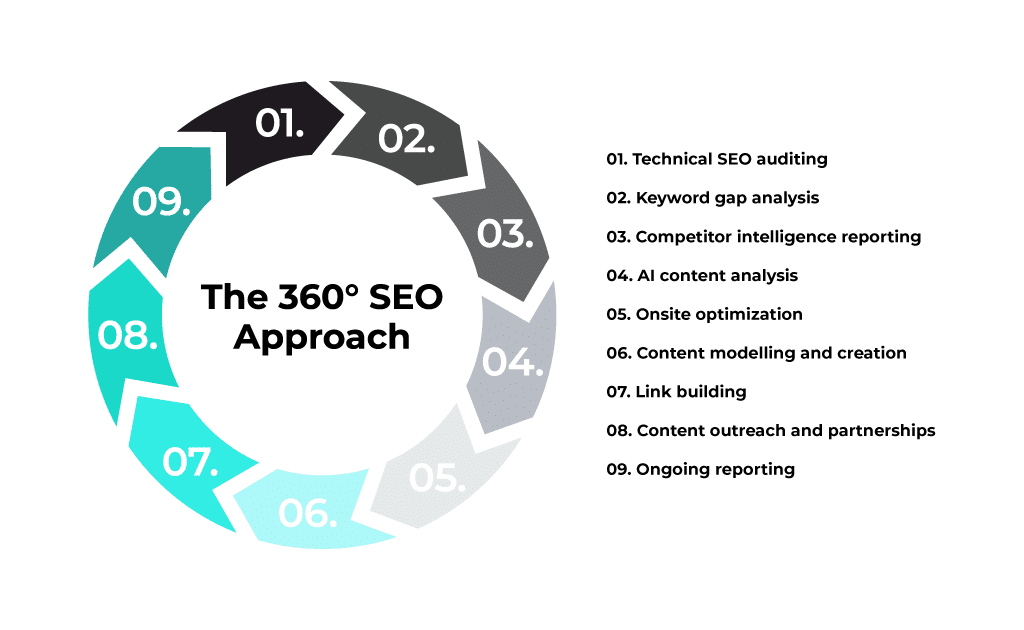
Boost your website rankings with a SaaS SEO audit
As a SaaS company, you need to generate as much organic traffic as possible. And you need to ensure that visitors stay on your site long enough to become familiar with your product (and hopefully sign up).
A SaaS SEO audit is the first step toward elevating your website’s ranking in the SERPs. It’s a big task, checking everything from page speed to backlinks to content quality. There are plenty of tools to help you do it, but you may need help from a SaaS SEO consulting service or agency to make the most of the insights.
